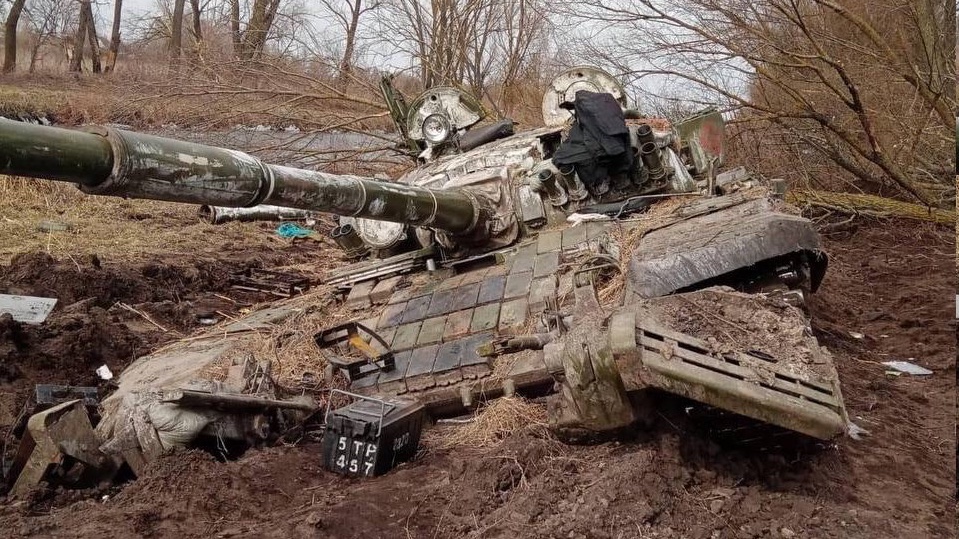
Day 20 of the Russian invasion of #Ukraine. Today I examine chemical weapons, why the Russians might use them and what the implications of any potential use might be. Warning – disturbing material ahead. 1/25 (Image – New Yorker) 

2/25 As always, a shout out to those reporting on the Russian invasion. This includes @KofmanMichael @maxseddon @IAPonomarenko @RALee85 @shashj @DanLamothe @ikhurshudyan @IanPannell @ChristopherJM @KyivPost among others. Please follow them.
3/25 In November 1989, as a new and inexperienced Lieutenant in the Australian Army, I attended a training course at the Sydney-based School of Military Engineering to learn about Nuclear, Biological, Chemical Defence. 

4/25 It was a sobering experience, as even in the final stages of the Cold War, the Soviets maintained a large stockpile of chemical, biological and nuclear weapons. I learned what a horrifically contaminated, lethal environment chemical war is.
5/25 The spectre of chemical or biological warfare has been raised by the Russian invasion of Ukraine. From December last year, the Russian government has been shaping the information environment to provide a foundation for Russian use of chemical weapons. understandingwar.org/backgrounder/w…
6/25 On 21 December 2021, Russian Defense Minister Sergey Shoigu accused the United States of planning a chemical attack in Donbas at a Ministry of Defense collegium with Russian President Vladimir Putin. politico.eu/article/russia…
7/25 Later in the same month, Russian media quoted a former Ukrainian Security Service (SBU) officer who apparently stated that Ukrainian Armed Forces will use chemical weapons to attack schools, hospitals, and mass gatherings in eastern Ukraine.
8/25 On 9 March, Russian Permanent Representative to the Organization for the Prevention of Chemical Weapons (OPCW) Alexander Shulgin claimed Russia would provide documents as evidence of Russian fears of an alleged Ukrainian chemical escalation.
9/25 The Russians have a long history of developing and even using chemical and biological weapons. Many nations had chemical or biological weapon programs during the Cold War. But nothing came anywhere near the size and scope of the Soviet program. 

10/25 The Soviets ran a massive chemical and biological warfare program that involved dozens of facilities across the nation, and the involvement of multiple government ministries. Kazakh-American biowarfare expert Ken Alibek’s book on this topic is chilling reading. 

11/25 At the end of the Cold War, the Soviets held a stock of over 40,000 metric tons of chemical weapons. United States and Russia signed agreements, to destroy these weapons. In 1997 both countries ratified the Chemical Weapons Convention (CWC).
12/25 Why might Putin consider the use of chemical or biological weapons in Ukraine? There are two main reasons.
13/25 First, and perhaps the most likely, is to use them as a false flag operation to justify Russian escalation in the war. The United States and its NATO allies have been busy attempting to pre-empt such an event. nbcnews.com/politics/natio…
14/25 Multiple statements from the US administration, NATO as well as from the Ukrainian President have sought to conduct what @TheStudyofWar calls ‘pre-bunking’. politico.eu/article/nato-c…
15/25 The second reason is that if the Russian invasion really starts to bog down, as it appears to have, Putin may become sufficiently desperate for a breakthrough to order the use of chemical weapons.
16/25 If we think the war is already horrific, we haven’t seen the worst of it. Putin and his generals could use a chemical or biological attack against concentrations of military forces or even against civilians in those cities that refuse to surrender.
17/25 What might be the impact of the Russians using chemical or biological weapons?
18/25 It would horrify most of the world, noting that audiences in Russia, China and North Korea are unlikely to be permitted to view such scenes by government censors.
19/25 Given their capacity for strategic communications, it is certain that the Ukrainians would broadcast such an attack, and its victims, to the world. This may change public opinion in multiple nations and increase support for military intervention. 

20/25 It may, therefore, further galvanise support from the US and NATO for the defence of Ukraine. Last Sunday, Polish President Duda stated that any Russian use of chemical weapons could be a ‘game-changer for NATO.’ jpost.com/breaking-news/…
21/25 If the Russians use chemical weapons, regardless of circumstances, the US President and NATO will have a very hard choice to make.
22/25 Will they continue to issue statements of support for Ukraine, engage in international legal manoeuvres but stop short of military intervention? Or might the US and NATO make the very difficult decision to deploy forces to stop Putin’s invasion?
23/25 Thus far, the Russians have refrained from crossing this particular ‘rubicon’. But given their stalled campaign and Putin’s need for ‘success’ it may yet be an option the Russians consider seriously. Afterall, the Russians appear unconcerned by their destruction of cities. 

24/25 To achieve a battlefield breakthrough, or success in an urban fight, large quantities would be required. While chemical weapons have been used in several places in the past 3 decades, using chemical weapons in Ukraine would be their first large scale use since WW1. 





25/25 Russian operations have been hindered by poor planning, the size of forces committed & attrition. This now has strategic consequences as their campaign culminates. As the Russians adapt, we should all hope that chemical weapons are not a solution they reach for. End.
• • •
Missing some Tweet in this thread? You can try to
force a refresh










